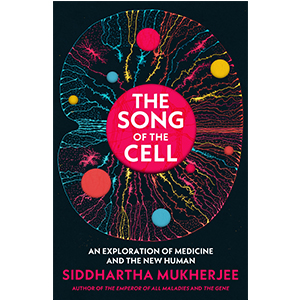The Song of the Cell: An Exploration of Medicine and the New Human
From the author of The Emperor of All Maladies, winner of the Pulitzer Prize, and The Gene, a #1 New York Times bestseller, comes his most spectacular book yet, about the fundamental unit of life. Rich with Mukherjee’s revelatory and exhilarating stories of scientists, doctors, and the patients whose lives may be saved by their work, The Song of the Cell is the third book in this extraordinary writer’s exploration of what it means to be human
This book is the story of the cell – past, present and future. Since the discovery of the cell in the 1660s and the discovery in the 1850s that most diseases can be traced back to our cells, human beings have been understood as an ecosystem of units that produce exponentially complex structures and effects.
How did we discover these units, and their functions? How did we begin to understand hearts, brains, kidneys as collections of cooperating cells? What are cells anyway? How do they work, and how (why?) do they work together? Why build organs and organisms out of these units?
And could we re-assemble a new kind of human? Could we alter cells to become resistant to diseases? Could we make new humans out of new kinds cells, endowed with novel properties, functions or intentions?
This book is about the building block of life: the cell. Its story is the story of modern medicine.
RM100.00
Out of stock
Description
From the author of The Emperor of All Maladies, winner of the Pulitzer Prize, and The Gene, a #1 New York Times bestseller, comes his most spectacular book yet, about the fundamental unit of life. Rich with Mukherjee’s revelatory and exhilarating stories of scientists, doctors, and the patients whose lives may be saved by their work, The Song of the Cell is the third book in this extraordinary writer’s exploration of what it means to be human
This book is the story of the cell – past, present and future. Since the discovery of the cell in the 1660s and the discovery in the 1850s that most diseases can be traced back to our cells, human beings have been understood as an ecosystem of units that produce exponentially complex structures and effects.
How did we discover these units, and their functions? How did we begin to understand hearts, brains, kidneys as collections of cooperating cells? What are cells anyway? How do they work, and how (why?) do they work together? Why build organs and organisms out of these units?
And could we re-assemble a new kind of human? Could we alter cells to become resistant to diseases? Could we make new humans out of new kinds cells, endowed with novel properties, functions or intentions?
This book is about the building block of life: the cell. Its story is the story of modern medicine.
Publisher: Bodley Head
Paperback
2022
ISBN: 9781847925985

 Dancing The Malaysian
Dancing The Malaysian
 Tall Tree, Nest of the Wind (The Javanese Shadow-play Dewa Ruai Performed by Ki Anom Soeroto) : A Study in Performance Philology
Tall Tree, Nest of the Wind (The Javanese Shadow-play Dewa Ruai Performed by Ki Anom Soeroto) : A Study in Performance Philology





